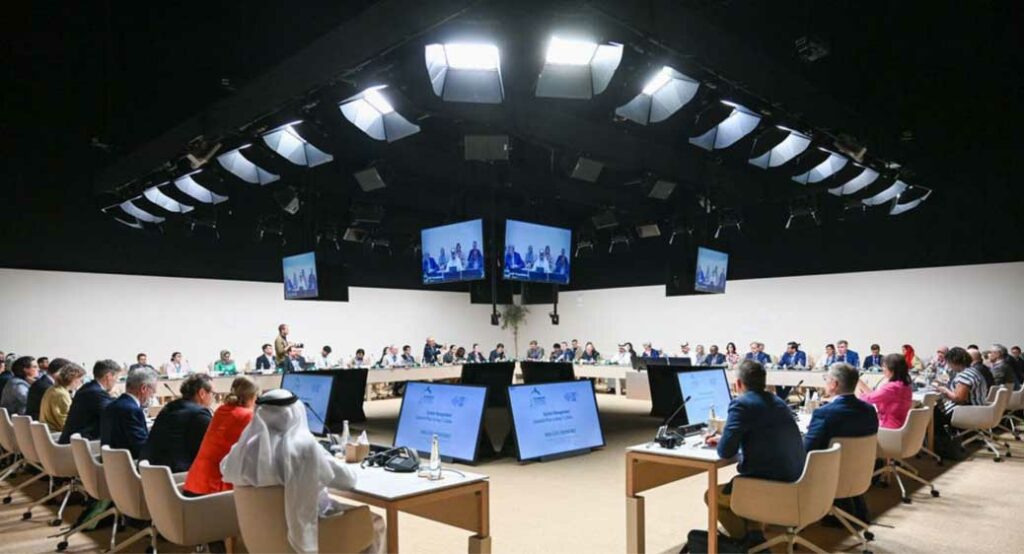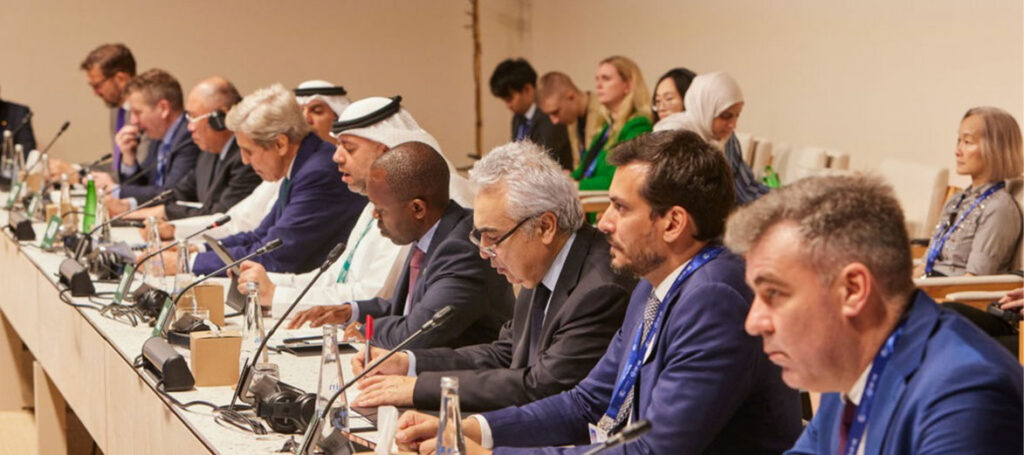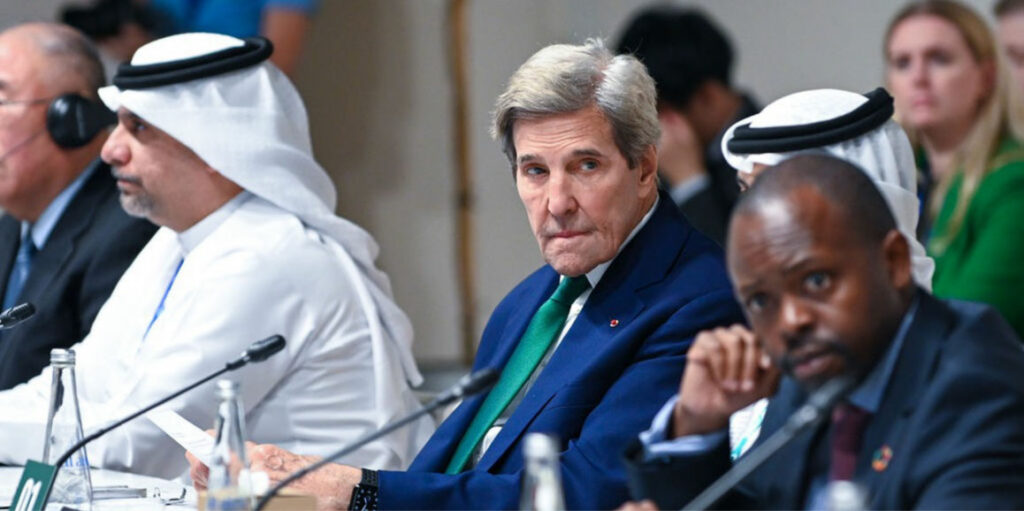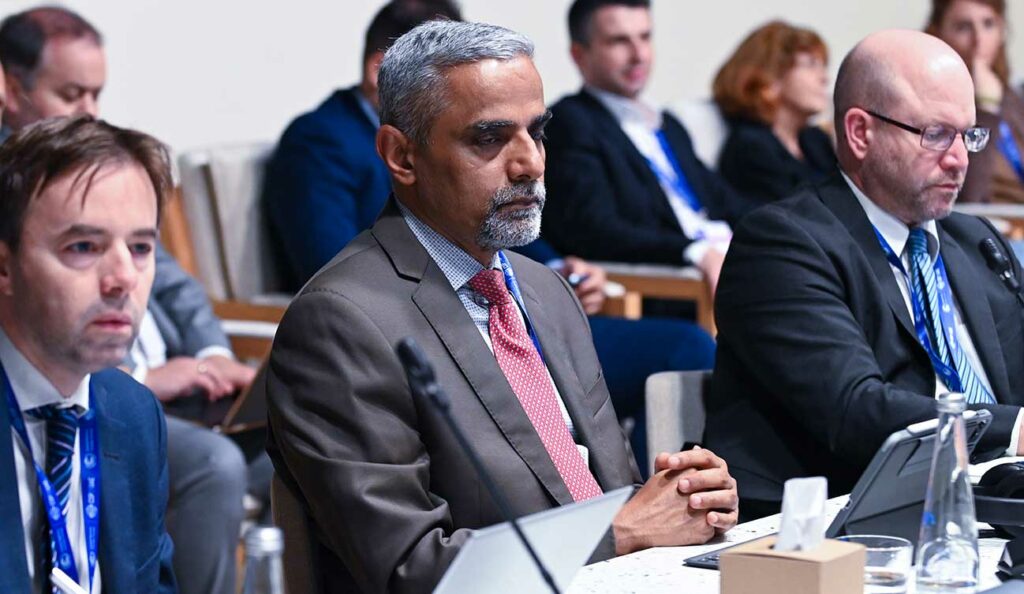The participating representatives of national governments (“Participants”) set forth the following Governance Structure for the Carbon Management Challenge (CMC).
1. Goals
The CMC seeks to:
1.1 Advance a pipeline of carbon management projects by 2030, that when fully operational, will collectively manage 1 gigatonne (Gt) of CO2 or more annually.
1.2 Call on other governments to join the CMC, and on the private sector to play a leadership role in deployment carbon management technologies and infrastructure.
1.3 Collaborate to enable developing countries to access financing for carbon management projects.
2. Organization
The CMC will be governed as follows:
2.1 The CMC committees are composed of a Steering Committee that will advance strategic objectives, country recruitment and resources towards the goals, as well as a Coordinating Committee that will develop and propose priorities, progress the workstreams, and oversee the management of the CMC.
Committees
2.2 The CMC committees will be composed of one representative plus an alternate from each of the following regional groups (1) East Asia-Pacific; (2) Europe; (3) Latin America and the Caribbean; (4) Middle East and North Africa; (5) North America; (6) South and Southeast Asia; and (7) Sub-Saharan Africa. Representatives will serve one or two year terms with staggered transitions.
2.3 Formal decisions requiring approval of all CMC participants: changing the governance structure, adding or removing workstreams, selecting workstream Co-Leads, changing funding arrangements and changing the secretariat.
2.3.1 The Coordinating Committee and Participants work under the principle of consensus, where formal decisions will require consensus among the Participants.
2.3.2 All decisions will be taken by consensus and on a no objection basis, i.e. if none of the Participants object to a formal decision within 42 calendar days of notification, the amendment will be deemed approved.
2.3.3 The CMC committees do not speak on behalf of individual participants.
Workstreams
2.4 The agreed Workstreams will implement the goals of the CMC, and will be Co-led by at least two nominated country participants every two years.
2.4.1 Participants can express their interest as a ‘Co-Lead’ nominee or to become a ‘Working Member’ in any of the Workstreams at any time.
2.4.2 Co-Leads and will have oversight on their specific Workstream deliverables and scopes of work.
2.4.3 Co-Leads will be composed of at least one developed and one developing country, with possibility of more than two Co-Leads, if desired.
2.4.4 Working Members will contribute towards achieving the specific Workstream’s deliverables and scopes of work.
2.5 On an annual basis, Workstream Co-Leads with support from Working Members and the secretariat will develop or update deliverables and scopes of work for approval by the Coordinating Committee in accordance with the agreed terms of reference, found in the annexes of this document.
2.6 Progress of the Workstreams will be presented, reviewed and revised where needed, in alignment with ministerial meetings.
2.7 The Workstreams should include the participation and engagement of “Observer” stakeholders and experts outside of government, as agreed to by respective Co-Leads.
Meeting Candence
2.8 The Workstreams will endeavour to meet every two to four weeks.
2.9 The Coordinating Committee will endeavour to meet on a monthly basis.
2.10 The Steering Committee will endeavour to meet every two months.
2.11 All Participants will endeavour to meet every quarter.
Secretariat
2.12 The principal coordinator of the CMC’s communications and activities is the Secretariat. The Secretariat, at the direction of the Coordinating Committee Co-Chairs will provide the following services: (1) acts as a central point for communication and organizes the meetings of the CMC and its workstreams; (2) oversees and supports the progress of the CMC’s initiatives; (3) arranges specific activities such as webinars, workshops, side-events, forums, summits and conferences; (4) manages CMC online platforms and databases; (5) assists the CMC in evaluating opportunities to advance carbon management in line with the aim of the CMC; (6) establishes and maintains key external relationships to support the CMC; (7) manages public CMC outreach programs and media; and (8) identifies and propose strategic opportunities for the CMC.
2.13 The Global CCS Institute acts as the Secretariat unless otherwise decided in accordance with Section 2.3.
2.14 Services from the Secretariat will be provided on a not-for-profit basis.
2.14.1 The Secretariat will provide periodic updates on the budget required for services.
2.14.2 On a voluntary basis the Participants may provide funding for the Secretariat
3. Participation
3.1 Countries may indicate their intent to join the CMC in writing to one of the Participants or to the Secretariat.
3.2 Participants define their national implementation strategies and determine how to contribute to the goals of the CMC.
3.2 Participants may withdraw from the CMC by giving 30 calendar days advance written notice to the Secretariat
4. Legal Status and Compliance with Laws
4.1 This Governance Structure, which is administrative in nature, does not create any legally binding obligations between or among its Participants. Participants and the secretariat will perform their roles in accordance with domestic and international laws applicable to them.
Annex 1: Terms of reference for developing country project finance, workstream 1
I. Context
Developing countries face heightened challenges in deploying carbon management technologies due to elements related to: (1) developing effective policy and regulatory frameworks to support carbon management initiatives; (2) assessing capture and storage opportunities from both technical feasibility and business viability standpoints and (3) affordable financing options for carbon management projects. While there are multilateral efforts to support carbon management in developing countries, including, inter alia, the Global Climate Fund, The Global Environment Facility’s Star allocation, these are insufficient to meet the scale of the challenge, with an urgent need to focus to enable all countries to meet their national climate targets and global emissions reductions.
II. Objectives
(a) accelerating financial support for carbon management in developing countries, based on readiness and needs;
(b) supporting legal and regulatory capacity building to ensure developing countries have appropriate governance structures in place to enable projects;
(c) evaluating potential geologic storage capacity in developing countries;
(d) identifying and addressing opportunities and challenges in developing countries from a business perspective;
(e) collaborating to advance existing and new financial policies to enable developing countries to access support for carbon management deployment in their countries; and
(f) leading a global effort to identify, advocate for implementation of policies and multilateral, bilateral and private sector initiatives that expand finance and private investment in carbon management projects and infrastructure in the Global South.
III. Activity areas
Possible future work for this workstream includes the following, which are subject to develop and evolve, through progress made within the workstream:
1. Publish a baseline report on the current state (a) legal and regulatory framework development in developing countries (b) capture and storage opportunities, including any data and analysis needs; and (c) available finance for developing countries that identifies near and longer-term opportunities to expand the pool of available capital.
2. Develop a developing country readiness and needs tool, based on key criteria for project deployment.
3. Work with multilateral development banks (MDBs), international finance institutions (IFIs), private sector and philanthropies to identify and advance low-cost carbon management investment opportunities in developing countries.
4. Support the use of the agreed carbon management technology methodologies for carbon market mechanisms internationally.
5. Develop recommendations to create business cases for carbon management technologies globally.
IV. Co-Leads
2024 – 2026: Kenya
2024 – 2026: Indonesia
2024 – 2026: United States
Annex 2: Terms of reference for project deployment and project tracking, workstream 2
I. Context
To oversee that global capacity for carbon management is growing at a pace in line with reaching gigatonne scale by 2030, it will be necessary to regularly track progress and organize efforts. Central to this assessment will be the ability to follow and verify CO2 storage activities and identify gaps in global project deployment to inform policy, research, development, and demonstration needs.
II Objectives
(a) supporting the scale up of carbon management to gigaton scale, leveraging existing efforts;
(b) identifying possible national carbon management related objectives and ambitions, inter alia, related deployment roadmaps/strategies, and supporting policy and business model guidance and knowledge sharing to support the build out of projects and associated infrastructure; and
(c) tracking progress towards the CMC goal of advancing projects by 2030 that will reach gigatonne scale and key aspects of carbon management development and deployment, including policy and project development, leveraging and coordinating with existing tracking efforts by other organizations.
III. Activity areas
Possible future work for this workstream includes the following, which are subject to develop and evolve, through progress made within the workstream:
1. Develop a dedicated tracking and verification project database towards collectively managing 1Gt of CO2 or more annually by 2030, leveraging existing work by other organizations, including operational and planned global carbon management projects.
2. Promote available policies and tools to support carbon management and project developers across key sectors.
3. On a voluntary basis, assist countries in evaluating carbon management opportunities, addressing barriers, advancing technical work programmes, preparing policy briefs, conducting comparative studies of regulatory, permitting and legal frameworks, and providing voluntary guidance for bilateral and multilateral cooperation.
4. Provide voluntary guidance on how integrating carbon management technologies can help preparing and implementing Nationally Determined Contributions (NDCs) and long-term low-emission development strategies (LT-LEDs) under the Paris Agreement.
5. Address key obstacles towards carbon management project development and deployment, leveraging existing work by other organizations.
6. Identify the technical gaps that need to be addressed to inform research, development and deployment (RD&D) needs and supporting, leveraging existing RD&D initiatives.
IV. Co-Leads
2024 – 2026: Brazil
Annex 3: Terms of reference for strategic communications and engagement, workstream 3
I. Context
Community engagement and stakeholder buy-in is key to supporting the scale-up of carbon management technologies across all regions. As the CMC works towards its goal, and with increased momentum for carbon management technologies internationally, a central role is needed to devise the necessary arrangements where the goal can be highlighted, learnings can be imparted, relationships are built, and the latest information on carbon management technologies are adequately socialised.
II. Objectives
(a) advancing international discussions on carbon management across national governments, multilateral institutions, industry and non- governmental entities to support the development and scale-up of carbon management technologies and infrastructure;
(b) elevating the strategic ambition of the CMC and advocating for carbon management in international fora;
(c) carrying the message that carbon management, in addition to other essential mitigation pathways, is integral to keeping the goal of limiting warming to 1.5°C within reach; and
(d) developing public messaging, outreach materials and educational content on carbon management.
III. Activity areas
Possible future work for this workstream includes the following, which are subject to develop and evolve, through progress made within the workstream:
1. Organise and participate in relevant international forums, summits, side events at major conferences, workshops, other events, webinars, etc., to advocate and promote the objectives and activities of the CMC.
2. Develop the strategic narrative and provide key messages to support alignment amongst Participants.
3. Work to convene an annual ministerial event, for example at the UNFCCC Conference of the Parties (COP).
4. Host convenings with the private sector towards supporting the CMC’s overall objectives.
5. Develop and implement public outreach programs to raise awareness, understanding and confidence in the deployment of carbon management.
6. Regularly review and make recommendations on the CMC website, including design and content updates.
7. Establish a social media presence for advocacy purposes.
8. Circulate a quarterly newsletter or digest to stakeholders.
9. Work alongside existing international partners with shared objectives, such as the Clean Energy Ministerial Carbon Capture Utilization and Storage Initiative (CEM CCUS) and Mission Innovation Carbon Dioxide Removal Mission (MI CDR).
10. Build bridges with influential NGOs, industry trade associations, private sector entities, international organisations, civil society organizations, research institutions, academia and others to heighten the impact of the CMC.
IV. Co-Leads
2024 – 2026: Saudi Arabia
2024 – 2026: United Kingdom









